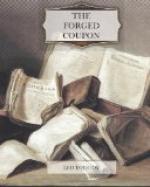This play was, in addition, a medium by which Tolstoy emphasised his abhorrence of military service, and probably for this reason its production is absolutely forbidden in Russia. A word may be said here on Tolstoy’s so-called Anarchy, a term admitting of grave misconstruction. In that he denied the benefit of existing governments to the people over whom they ruled, and in that he stigmatised standing armies as “collections of disciplined murderers,” Tolstoy was an Anarchist; but in that he reprobated the methods of violence, no matter how righteous the cause at stake, and upheld by word and deed the gospel of Love and submission, he cannot be judged guilty of Anarchism in its full significance. He could not, however, suppress the sympathy which he felt with those whose resistance to oppression brought them into deadly conflict with autocracy. He found in the Caucasian chieftain, Hadji Murat, a subject full of human interest and dramatic possibilities; and though some eight years passed before he corrected the manuscript for the last time (in 1903), it is evident from the numbers of entries in his diary that it had greatly occupied his thoughts so far back even as the period which he spent in Tiflis prior to the Crimean war. It was then that the final subjugation of the Caucasus took place, and Shamil and his devoted band made their last struggle for freedom. After the lapse of half a century, Tolstoy gave vent in “Hadji Murat” to the resentment which the military despotism of Nicholas I. had roused in his sensitive and fearless spirit.
Courage was the dominant note in Tolstoy’s character, and none have excelled him in portraying brave men. His own fearlessness was of the rarest, in that it was both physical and moral. The mettle tried and proved at Sebastopol sustained him when he had drawn on himself the bitter animosity of “Holy Synod” and the relentless anger of Czardom. In spite of his nonresistance doctrine, Tolstoy’s courage was not of the passive order. It was his natural bent to rouse his foes to combat, rather than wait for their attack, to put on the defensive every falsehood and every wrong of which he was cognisant. Truth in himself and in others was what he most desired, and that to which he strove at all costs to attain. He was his own severest critic, weighing his own actions, analysing his own thoughts, and baring himself to the eyes of the world with unflinching candour. Greatest of autobiographers, he extenuates nothing: you see the whole man with his worst faults and best qualities; weaknesses accentuated by the energy with which they are charactered, apparent waste of mental forces bent on solving the insoluble, inherited tastes and prejudices, altruistic impulses and virile passions, egoism and idealism, all strangely mingled and continually warring against each other, until from the death-throes of spiritual conflict issued a new birth and a new life. In the ancient Scripture “God is love” Tolstoy discerned fresh meaning, and strove with superhuman energy to bring home that meaning to the world at large. His doctrine in fact appears less as a new light in the darkness than as a revival of the pure flame of “the Mystic of the Galilean hills,” whose teaching he accepted while denying His divinity.




